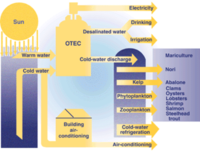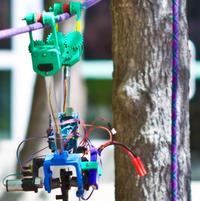-
Ocean thermal energy conversion power plant to be built off southern China’s coast

Lockheed Martin has announced that it is working with Chinese company Reignwood Group to develop an Ocean Thermal Energy Conversion (OTEC) pilot power plant off the coast of southern China. The prototype plant will be the first project in the multi-billion dollar clean energy agreement between the two companies. OTEC takes the natural temperature difference found in the ocean in tropical regions and uses it to create power. This technology is well-suited to island and coastal communities.
-
-
U.S., China in high-level military talks
Representatives of China and the United States met on Monday for the highest-level military talks between the two counties in almost two years. In the meeting, a senior Chinese general pledged to work with the United States on cybersecurity because the effects of a major cyber attack “may be as serious as a nuclear bomb.”
-
-
Monitoring elusive collisions in space

Many collisions occur between asteroids and other objects in our solar system, but scientists are not always able to detect or track these impacts from Earth. The “rogue debris” created by such collisions can sometimes catch us by surprise. Space scientists have now devised a way to monitor these types of collisions in interplanetary space by using a new method to determine the mass of magnetic clouds that result from the impacts.
-
-
DOE seizes $21 million from Fisker after company fails to make monthly payment on loan
The administration seized $21 million from auto company Fisker Automotive, less than a month after the automaker laid off three quarters of its employees due to financial and production problems. Fisker, based in Anaheim, California, was awarded a $192 million loan as part of a program started by the Obama administration to boost electric cars and other alternative-fuel vehicles.
-
-
Ammonium nitrate fertilizers are inherently risky, but the benefits are many
The deadly explosion has brought the $10 billion U.S. fertilizer industry to the attention of the mainstream media, but the risks inherent in fertilizer production and storage are not a secret to people close to the industry. Ammonium nitrate may be dangerous, but its benefits cannot be ignored.
-
-
Reinvestment in U.S. water infrastructure should be a top national priority
The U.S. water infrastructure is often called the “invisible infrastructure” – a vast, largely invisible network of pipes and tunnels — nearly 1.4 million miles span across the United States, which is eight times the length of the U.S. highway system. Much of the U.S. infrastructure was built more than a century ago, and currently around 10 percent of these systems are at the end of their service life. If not addressed by 2020, this number could rise to 44 percent. A summit meeting of the U.S. water community calls on Congress to make water infrastructure a top national priority.
-
-
Interior Dept. releases progress report on U.S. Water Census
The U.S. Interior Department issued released a report to Congress on the progress of the National Water Census. As competition for water grows — for irrigation of crops, for use by cities and communities, for energy production, and for the environment — the need for the National Water Census and related information and tools to aid water resource managers also grows. The Water Census will assist water and resource managers in understanding and quantifying water supply and demand, and will support more sustainable management of water resources.
-
-
White House threatens to veto House cybersecurity bill
The White House on Tuesday threatened to veto the cybersecurity bill drafted by the House of Representatives. The house is expected to vote on the bill later this week. The cybersecurity bill died in the Senate last August after the White House said it would veto the bill.
-
-
Robot makes inspecting power lines simple, inexpensive

Mechanical engineers invented a robot designed to scoot along utility lines, searching for damage and other problems that require repairs. Made of off-the-shelf electronics and plastic parts printed on an inexpensive 3D printer, the SkySweeper prototype could be scaled up for less than $1,000, making it significantly more economical than the two models of robots currently used to inspect power lines.
-
-
Energy Department to invest in used nuclear fuel storage research
As part of its efforts to develop an effective strategy for the safe and secure storage and management of used nuclear fuel, the Energy Department the other day announced a new dry storage research and development project. In the Energy Department’s budget request presented last week, the department requested $60 million for nuclear waste research and development.
-
-
Scientists discover new materials to capture methane
Scientists have discovered new materials to capture methane, the second highest concentration greenhouse gas emitted into the atmosphere. Unlike carbon dioxide, the largest emitted greenhouse gas, which can be captured both physically and chemically in a variety of solvents and porous solids, methane is completely non-polar and interacts very weakly with most materials.
-
-
First U.S. commercial enhanced geothermal system connected to the grid

Enhanced geothermal system (EGS) projects capture power from intensely hot rocks, buried thousands of feet below the surface, which lack the permeability or fluid saturation found in naturally occurring geothermal systems. The Energy Department the other day announced the U.S. first commercial EGS project which supplies electricity to the grid.
-
-
Former NRC chairman: all 104 U.S. nuclear reactors suffer from “irreparable” safety issues
According to former U.S. Nuclear Regulatory Commission (NRC) chairman Gregory Jaczko, all 104 nuclear reactors in the United States currently have irreparable safety issues and should be shut down and replaced. Jaczko was the NRC chairman from 2009 through 2012.
-
-
Critics: Fukushima-influenced U.S. nuclear accident response procedures are flawed
The U.S. government is using the Fukushima nuclear disaster in Japan two years ago as a model for rewriting its plans on how to respond to radiation contamination — emphasizing long-term cleanup and return of residents to affected areas instead of emergency response. Critics say this is a mistake.
-
-
Larger fire-fighting crews save lives, limit damage in high-rise fires
Between 2005 and 2009 there were, on average, 15,700 high-rise structure fires annually in the United States. Average annual losses totaled 53 civilian deaths, 546 civilian injuries, and $235 million in property damage. When responding to fires in high-rise buildings, firefighting crews of five or six members — instead of three or four — are significantly faster in putting out fires and completing search-and-rescue operations, concludes a major new study.
-
More headlines
The long view
Water Wars: A Historic Agreement Between Mexico and US Is Ramping Up Border Tension
As climate change drives rising temperatures and changes in rainfall, Mexico and the US are in the middle of a conflict over water, putting an additional strain on their relationship. Partly due to constant droughts, Mexico has struggled to maintain its water deliveries for much of the last 25 years, deliveries to which it is obligated by a 1944 water-sharing agreement between the two countries.
Trump Is Fast-Tracking New Coal Mines — Even When They Don’t Make Economic Sense
In Appalachian Tennessee, mines shut down and couldn’t pay their debts. Now a new one is opening under the guise of an “energy emergency.”
Smaller Nuclear Reactors Spark Renewed Interest in a Once-Shunned Energy Source
In the past two years, half the states have taken action to promote nuclear power, from creating nuclear task forces to integrating nuclear into long-term energy plans.
Keeping the Lights on with Nuclear Waste: Radiochemistry Transforms Nuclear Waste into Strategic Materials
How UNLV radiochemistry is pioneering the future of energy in the Southwest by salvaging strategic materials from nuclear dumps –and making it safe.
Model Predicts Long-Term Effects of Nuclear Waste on Underground Disposal Systems
The simulations matched results from an underground lab experiment in Switzerland, suggesting modeling could be used to validate the safety of nuclear disposal sites.
